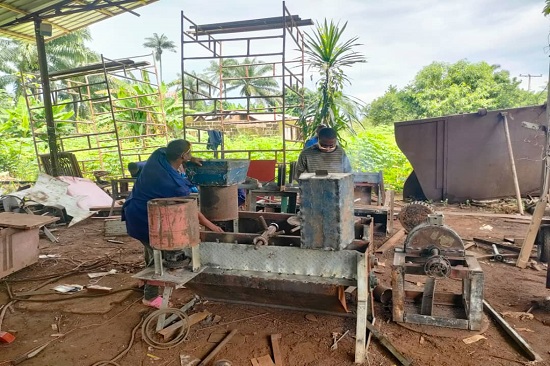
Empowering Futures: The Impact of Technical and Trade Skills Training by The Iwukem Development Foundation (TIDF)
Technical and trade skills have become indispensable in today’s dynamic job market. The Iwukem Development Foundation (TIDF) recognises the growing need for these skills and is dedicated to empowering individuals through comprehensive training programmes. This initiative focuses on providing practical skills that are essential for both personal advancement and community development. This article delves into how TIDF’s technical and trade skills training is transforming lives and fostering sustainable development.
The Significance of Technical and Trade Skills
Technical and trade skills encompass a variety of practical abilities required to perform specific tasks in various trades and industries. These skills include, but are not limited to, welding, carpentry, plumbing, and tailoring. Mastery of these skills is crucial for individuals seeking stable employment and career growth in today’s economy.
TIDF’s technical and trade skills programmes are designed to meet the increasing demand for skilled workers. By providing training in essential trades, TIDF helps bridge the gap between education and employment. This focus not only enhances individuals’ employability but also supports broader economic development by cultivating a skilled workforce ready to tackle industry challenges.
Bridging the Skills Gap
Many individuals from underprivileged backgrounds face significant barriers to acquiring technical and trade skills due to a lack of resources and access to training facilities. TIDF’s programmes aim to address these challenges by offering accessible, high-quality training that prepares participants for real-world applications.
The training covers a range of trades, including welding and metal work, carpentry and woodwork, plumbing, and electrical work. By focusing on practical, hands-on experience, TIDF ensures that participants gain the skills necessary to succeed in their chosen fields. This approach not only equips individuals with the technical expertise they need but also boosts their confidence and job readiness.
Creating Sustainable Livelihoods
Technical and trade skills training is not solely about employment; it also plays a crucial role in creating sustainable livelihoods. TIDF’s programmes enable individuals to gain skills that can lead to self-employment and entrepreneurship. This aspect of the training supports economic independence and fosters entrepreneurship within communities.
For instance, training in tailoring and fashion design can lead to the establishment of small businesses where individuals can produce and sell their products. Similarly, skills in carpentry and plumbing can facilitate the provision of essential services within local communities, contributing to economic growth and development. By focusing on sustainable livelihoods, TIDF’s programmes have a lasting impact on both individuals and the wider community.
Enhancing Community Development
The benefits of technical and trade skills training extend beyond personal achievement. By equipping individuals with valuable skills, TIDF contributes significantly to community development. Skilled workers often become key contributors to their communities, driving economic progress and social change.
Communities gain from having a skilled workforce capable of addressing local needs and challenges. For example, trained technicians and craftsmen can improve infrastructure, enhance living standards, and create job opportunities. Furthermore, individuals who acquire technical skills often engage in community activities, share their knowledge, and act as role models, thereby inspiring others to pursue similar paths.
Long-Term Impact and Success Stories
The long-term impact of technical and trade skills training by TIDF is evident through numerous success stories. Many beneficiaries of TIDF’s programmes have achieved notable milestones in their careers, highlighting the effectiveness of the training and the positive changes it fosters.
For example, a participant trained in welding and metalwork might establish a successful business, creating job opportunities and contributing to local economic development. Similarly, a graduate of a carpentry programme might become a sought-after artisan, influencing the industry and inspiring others to develop their skills.
Conclusion
Technical and trade skills training provided by The Iwukem Development Foundation (TIDF) is transformative, offering individuals practical skills essential for personal and professional growth. By bridging the skills gap, creating sustainable livelihoods, and enhancing community development, TIDF’s programmes have a profound impact on individuals and their communities. TIDF’s commitment to technical and trade skills training reflects its dedication to addressing the needs of underprivileged individuals and supporting their journey towards self-sufficiency. As the job market continues to evolve, the importance of these skills will only increase. Through its focused efforts, TIDF is not only improving lives but also contributing to sustainable development and community advancement.
[…] TIDF’s Commitment to Technical and Trade Skills […]
Simply wish to say your article is as astonishing. The clarity in your post is simply cool and i could assume you’re an expert on this subject. Well with your permission allow me to grab your RSS feed to keep up to date with forthcoming post. Thanks a million and please carry on the gratifying work.
Thank you so much for your kind words!
We’re thrilled to hear that you enjoyed the article.
Your feedback means a lot to us, and we’re glad that the content resonated with you.
Of course, feel free to subscribe to our RSS feed to stay updated on our future posts.
We truly appreciate your support and encouragement, and we’ll continue striving to provide valuable content.
Thanks again for reaching out!